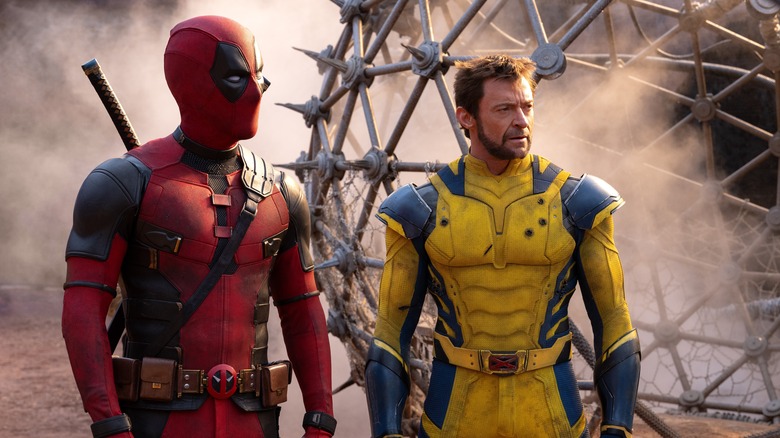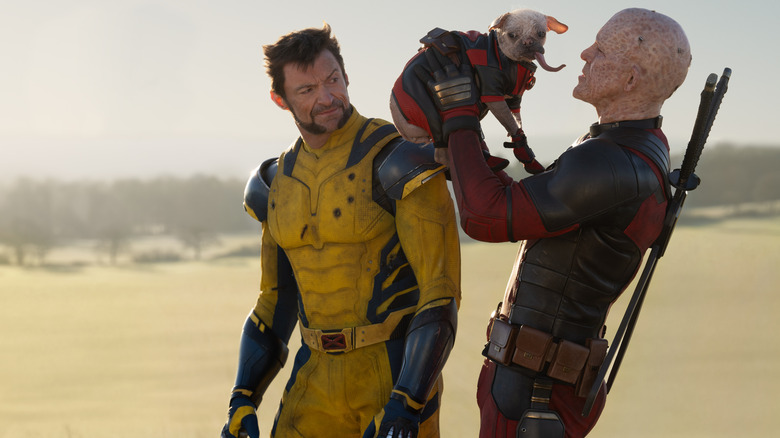Deadpool & Wolverine Supercharged A Marvel Trend, And It Won't Stop Any Time Soon
Anyone with an active internet feed of some kind — not just those who are obsessed with superheroes — is likely very aware that "Deadpool & Wolverine" hit theaters over the weekend. That's because the R-rated comic book team-up opened to a record-shattering $211 million domestically at the box office, giving it literally one of the biggest opening weekends of all time. While there are many reasons for the movie's success in the early going, the primary reason is right there in the title: People really wanted to see Ryan Reynolds' Deadpool get a proper team-up with Hugh Jackman's Wolverine. It's certainly not the first time the Marvel Cinematic Universe has employed such a tactic to drum up interest in a movie, but this gargantuan success also ensures it's definitely not going to be the last.
Even going back to earliest days of the MCU when there were references in "Iron Man 2" to Captain America, or a post-credits scene teeing up the debut of Thor, this whole enterprise was built on the notion of getting to see different superheroes interacting with one another on screen. That's what made 2012's "The Avengers" a record-breaking, $1.5 billion box office success story in its day. At the same time, taking a franchise like "Deadpool" that previously existed outside of the MCU and supercharging it with a huge budget and a multiverse storyline that packed it with appearances from other heroes adds another layer to the proceedings.
2016's "Deadpool" was a relatively small affair compared to other superhero movies, and its script even made jokes about having limited access to the larger X-Men universe. That helped the first film stand out among the crowd. "Deadpool & Wolverine" certainly stands apart, in that it feels like a proper MCU crossover event, albeit one that still passes through this character's very unique filter. This notion of using the appeal of one character to help lift up another's commercial prospects is nothing new, but Marvel Studios seems to be doubling down on it to great effect.
The MCU uses characters to lift up other characters, just like the comics
To that end, it was recently announced that Robert Downey Jr. will return to the MCU, not as Tony Stark, but as a version of Doctor Doom. He'll portray the fan-favorite character in both "Avengers: Doomsday" and "Avengers: Secret Wars," going from hero to villain thanks to magic of the multiverse. For better or worse, Marvel Studios is leaning hard on using beloved characters and actors to maximize appeal in other franchises.
Does this mean that the MCU is only going to focus on team-ups and crossovers in the foreseeable future? Probably not. Let's not forget that "Guardians of the Galaxy Vol. 3" ($845 million worldwide) and "Black Panther: Wakanda Forever" ($859 million worldwide) were both gigantic hits that didn't rely on pulling in other characters from elsewhere in the Marvel multiverse. At the same time, "Spider-Man: No Way Home" ($1.9 billion worldwide) and "Doctor Strange in the Multiverse of Madness" ($955 million worldwide) set new high bars for those respective franchises using this type of crossover storytelling.
One thing worth remembering is that this does all sort of go back to the pages of Marvel Comics. "The Avengers" were created in the '60s to help unite readers of the publisher's various solo comics. Marvel and DC still publish big crossover events to this day, with "Secret Wars" ranking as one of the most cherished storylines in mainstream comic book history. This is all very much rooted in the source material. It's not inherently a bad thing — it's all about execution and not relying on it too much as a crutch.
I spoke more about this on today's episode of the /Film Daily podcast, which you can listen to below:
You can subscribe to /Film Daily on Apple Podcasts, Overcast, Spotify, or wherever you get your podcasts, and send your feedback, questions, comments, concerns, and mailbag topics to us at bpearson@slashfilm.com. Please leave your name and general geographic location in case we mention your e-mail on the air.

